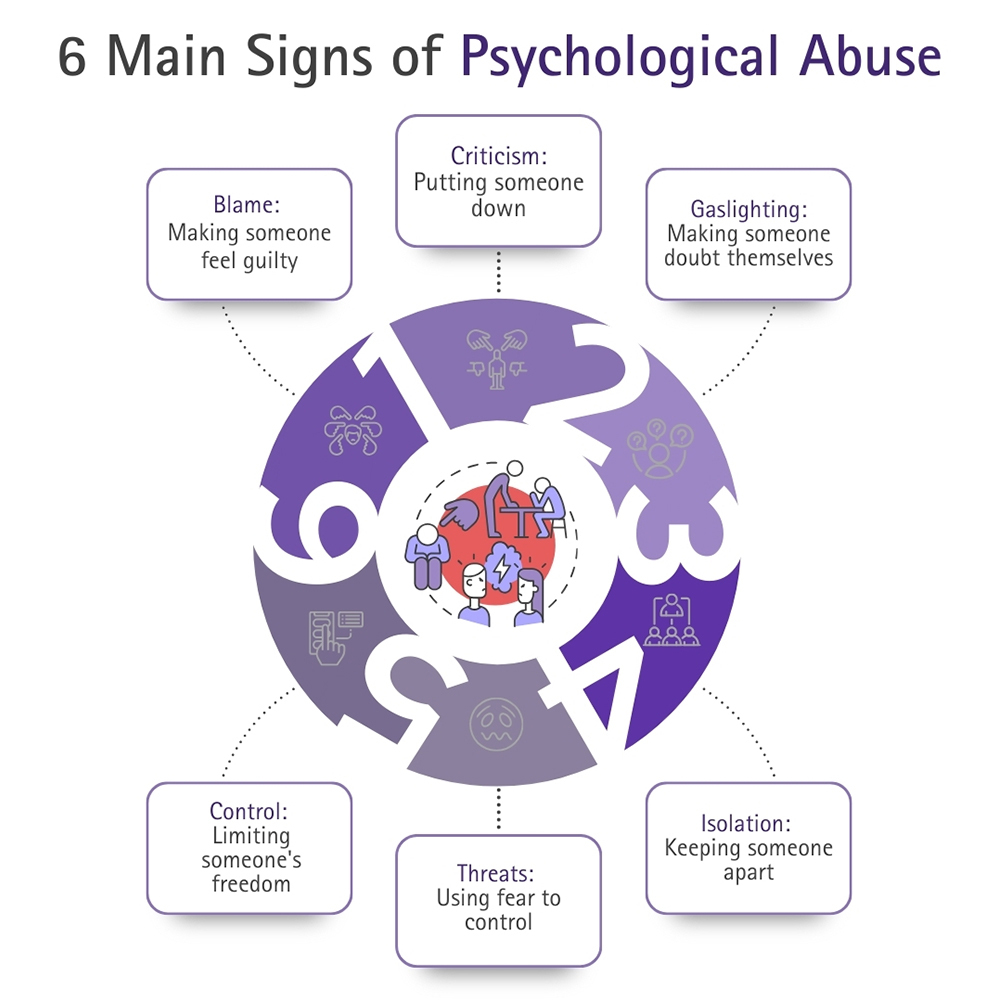Understanding Abuse
What Is Physical Abuse?

Physical abuse involves intentionally harming or causing injury to someone. Physical abuse is usually used to control or intimidate someone, such as with domestic violence and in abusive relationships. This can be hitting, slapping, punching, kicking, shoving, pushing, choking, or throwing objects. Physical distress can cause psychological trauma, whether it occurred once or is ongoing, and is also considered a crime.
Abuse typically starts slowly. The precursor to physical assault may be emotional abuse, manipulation, or gaslighting. The cycle of abuse begins with tension, which leads to an incident, which then leads to reconciliation and calm. The calm turns into tension, and the cycle continues.
Physical abuse from a parent significantly traumatizes the child, which can have long-lasting negative effects on the psychology and mental health of the child. Anything that physically wounds the child, whether it leaves a mark or not, is considered child abuse or physical abuse.
If you have experienced abuse as a child or adult, our sensitive and experienced trauma therapists can help you overcome the long-lasting negative effects you have been living with all your life. Our dedicated trauma therapists are committed to helping you foster resilience, engage in self-care, and embrace self-compassion – crucial elements on your path to healing.
Abuse Online Therapy or Virtual Consultations
What Is Psychological Abuse?
Psychological abuse is the use of manipulation in an attempt to harm someone. It is often a way for the abuser to exhibit power and control the other person. Psychological abuse can happen at any age, from childhood to the elderly.
Psychological abuse, also known as emotional abuse, can include:
- Being belittled
- Feeling controlled
- Being threatened
- Being isolated
- Feeling worthless
If you are experiencing any of these signs, it is important to reach out for help.

How to Deal with Psychological Abuse?
Dealing with psychological abuse is a challenging situation to navigate. Here are some important aspects of maintaining your well-being while dealing with psychological abuse:
- Awareness: Bringing your awareness to psychological abuse is the first step to overcoming this trauma.
- Seek safety: Make sure you have a safety plan. This can be difficult to come up with on your own, so reach out to support, whether it’s a trusted friend, family member, or professional.
- Limit contact: If possible, it is best to set boundaries with the abuser and avoid contact.
- Practice self-care: You deserve to take care of yourself. Depending on your situation, this can look different. Just remember to be safe.
- Get help: It is difficult to deal with the effects of psychological abuse on your own. A counselor can provide you with guidance, coping strategies, and emotional support.
Asking for help takes courage. You deserve to live free of the effects of psychological abuse. Give yourself the chance to alleviate the emotional burden.
What Is Sexual Abuse?
Sexual abuse is non-consensual or exploitative sexual activity forced on an individual. Sexual abuse can range from unwanted touching to exploitation to sexual violence and sex trafficking. It is a traumatic experience that can have lasting psychological effects on the sexual abuse victim.
Impact of Abuse
What Are Signs of Sexual Abuse?
Signs of sexual abuse can vary depending on the person or situation. But here are some things to look out for:
- Behavior changes: These can be sudden shifts in mood, increased anxiety, or a loss of interest in things you used to enjoy.
- Difficulty forming relationships: Sexual abuse affects the ability to trust others, vulnerability, and maintain emotional connections.
- Flashbacks and nightmares: Traumatic events can cause PTSD symptoms such as nightmares, difficulty sleeping, panic attacks, and unwanted memories, which can significantly disrupt daily life.
- Low self-esteem: Feelings of shame and guilt are normal after sexual assault, which can decrease self-esteem.
- Anxiety and depression: Sexual assault can trigger anxiety and depressive symptoms, along with other mental illnesses.
- Substance use: Sexual abuse can lead to substance use to deal with mental and emotional distress. Substances are used as a coping mechanism after trauma.
If you believe someone you know may be a sexual abuse victim, talk to them and offer support.
Therapy Options
Abuse therapy begins with a conversation between you and your therapist about what to expect. Your therapist will explain the step-by-step process and offer you options for interventions.
Therapy is a collaborative process. Your therapist can help you best if you remain honest and open.
Therapy is a safe space. Our therapists listen with open-mindedness and provide feedback and guidance based on your personal needs.
Healing from abuse is a long-term process that requires bravery, support, and self-care. Some steps to start healing from abuse include:
- Seek safety: If you are currently going through abuse, seek safety first. Ask a friend, family member, or a local domestic violence shelter for help.
- Seek professional care: It would take a lot more time and effort to heal your trauma on your own without the guidance of a therapist.
- Utilize a support system: While having a therapist is the first step in healing, it is also important to have a peer support system of healthy relationships to help you heal.
- Practice self-care: Sometimes, the most important part of recovery is learning to care for yourself and treat yourself with love and compassion.
Healing from abuse is not going to be linear, and it will be multifaceted. Our top-rated trauma therapists can help you begin your journey to healing while supporting you every step of the way.
Finding a Therapist in Palm Beach
Qualifications to Look For
The best therapist for physical, psychological, or sexual abuse is a trauma therapist. Look for someone who specializes in trauma-informed care and evidence-based interventions for PTSD. Our therapists are experienced in working with trauma survivors and have the empathy and skill set to help you navigate this challenging terrain.
Therapy Techniques
Your therapist will guide you in how to begin talking about and healing your sexual assault trauma. If you have experienced sexual abuse, the first step is to show up. Your therapist may ask you about your needs and goals. You only need to talk about what you are ready for, and you can take therapy at your own pace.
Some evidence-based interventions for abuse include:
- Eye movement desensitization and reprocessing (EMDR): Uses bilateral stimulation to help desensitize the strong emotions associated with the traumatic memory.
- Cognitive behavioral therapy (CBT): Uses cognitive reframing to challenge the recurring negative thoughts and beliefs that cause negative feelings.
- Narrative exposure therapy (NET): Uses written or drawn narratives to process trauma.
- Dialectical behavioral therapy (DBT): Uses mindfulness skills and distress tolerance to
Talk to your counselor for guidance on which therapy technique is most appropriate for you. These therapy options are available to you in West Palm Beach and all across Palm Beach County, as well as virtually.
Everything you say in your therapist’s office is confidential. Therapists are mandated reporters if you admit to having plans of hurting someone else or yourself. Psychologists and therapists have a legal and ethical duty to protect their clients and the community.
Our counselors understand that your experiences are unique and approach therapy as such. Our perceptive therapists don’t believe in one-size-fits-all therapy and will create a tailored client-centered approach just for you.
For more information about our counselors or to schedule an appointment with an abuse therapist, call our office today.
(561) 363-7994Types of Therapy
Individual Therapy
Individual therapy provides you with a safe, supportive, and confidential space to process your trauma and move forward from negative experiences to a fulfilling life.
Group Therapy
Group therapy provides you with an opportunity to connect with peers who have similar experiences and are working towards similar goals.
Self-Care
Building a Support System
Healing is not a linear journey. Having a support system can help you express your feelings in a safe and supportive environment. Your support system can consist of family, friends, your therapist, and people you meet in support groups.
Healthy Coping Mechanisms
Challenges are inevitable. In therapy, you will learn coping skills that can be helpful in future stressful situations.
Some examples of coping mechanisms include:
- Exercise: Physical activity is not only great for physical health, but also for mental health as a way to reduce stress.
- Journaling: Writing can help express painful emotions, identify patterns and process triggers.
- Relaxation exercises: Relaxing the muscles in the body can help alleviate psychological symptoms related to trauma.
Your therapist will offer various coping mechanisms for you to try and identify which you prefer to use for your healing journey.
Additional Resources:
If you or a loved one is experiencing any form of abuse, consider contacting one of the resources below:
- The National Domestic Violence Hotline: 1-800-799-SAFE (7233)
- MentalHealth.gov: https://www.samhsa.gov/
- The Rape, Abuse & Incest National Network (RAINN): https://rainn.org/about-rainn
In your healing journey from physical, psychological, and sexual abuse, our West Palm Beach trauma therapists prioritize your safety and well-being. With trust as the foundation, we offer tailored therapies like CBT and EMDR. Take the courageous step to reclaim your life—schedule an appointment today.
Sources:
https://pubmed.ncbi.nlm.nih.gov/11036707/

